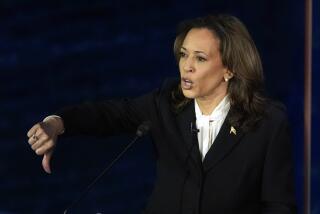Beginning of WWII 70 years ago marked at Polish site
- Share via
GDANSK, POLAND — Former enemies and allies somberly marked the 70th anniversary of the start of World War II on Tuesday, underlining the need to remember the bloodiest conflict of the 20th century so as not to repeat it.
Russian Prime Minister Vladimir Putin, whose country sided with Nazi Germany during the initial invasion of Poland in 1939 before later opposing Germany, said the war and its causes needed to be studied from all perspectives.
“We should examine everything which ended up bringing about the tragedy of Sept. 1, 1939,” Putin said, standing next to Polish Prime Minister Donald Tusk after the two met ahead of official commemorations. “We must do this so that this tragedy never happens again.”
Poland’s leaders gathered at dawn on Gdansk’s Westerplatte peninsula to mark the exact time the German battleship Schleswig-Holstein shelled a tiny Polish military outpost housing a naval arsenal, precipitating the war’s first armed clash.
Red-and-white Polish flags fluttered as the officials opened the ceremony at 4:45 a.m., placing wreaths at the foot of the monument to the defenders of Westerplatte. An honor guard looked on.
“Westerplatte is a symbol, a symbol of the heroic fight of the weaker against the stronger,” President Lech Kaczynski said. “It is proof of patriotism and an unbreakable spirit.”
Tusk warned of the dangers of forgetting the war’s lessons.
“We meet here to remember who started the war, who the culprit was, who the executioner in the war was, and who was the victim of this aggression,” Tusk said.
The initial German attack on Poland triggered more than five years of war that would engulf the world and result in the slaughter of more than 50 million people.
Poland alone lost nearly 6 million citizens, half of them Jews. During the German occupation, the country was used as a base for the Nazis’ genocide machinery.
At the height of World War II, the European theater stretched from North Africa to the outskirts of Moscow, and pitted Germany and its allies, including Italy, against Britain, the Soviet Union and the United States, along with a host of other countries.
More to Read
Sign up for Essential California
The most important California stories and recommendations in your inbox every morning.
You may occasionally receive promotional content from the Los Angeles Times.













